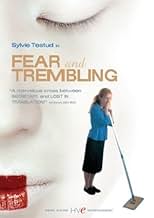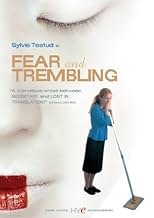Agrega una trama en tu idiomaA Belgian woman looks back on her year at a Japanese corporation in Tokyo in 1990. She is Amélie, born in Japan, living there until age 5. After college graduation, she returns with a one-ye... Leer todoA Belgian woman looks back on her year at a Japanese corporation in Tokyo in 1990. She is Amélie, born in Japan, living there until age 5. After college graduation, she returns with a one-year contract as an interpreter. The vice president and section leader, both men, are boors,... Leer todoA Belgian woman looks back on her year at a Japanese corporation in Tokyo in 1990. She is Amélie, born in Japan, living there until age 5. After college graduation, she returns with a one-year contract as an interpreter. The vice president and section leader, both men, are boors, but her immediate supervisor, Ms. Mori, is beautiful and trustworthy. Amélie's downfall b... Leer todo
- Premios
- 5 premios ganados y 2 nominaciones en total
- Dirección
- Guionistas
- Todo el elenco y el equipo
- Producción, taquilla y más en IMDbPro
Opiniones destacadas
But, whereas this film has its comedic moments, it's not the same kind of comedy as the above, and not just because it was made in Japan, although that helped.
This really is a story about the difficulties in communication and understanding that exist between cultures and, arguably, those differences between Japanese culture and Western are, or can be, daunting.
Happily, the director presents the narrative from the Amelie's (Sylvie Testud) point of view almost exclusively. In doing so, he exposes and satirizes some of the ridiculous situations that do exist in the Japanese workplace, which, in another culture, would also be equally stupid, if not criminal.
Everybody's come up against tunnel vision in a supervisor. And the same goes for professional jealousy between co-workers. The difference with this film is, of course, the fact that Japanese modes of interaction, manager-worker relationships and, most importantly, individual initiative are regarded very differently when compared to similar conditions in an office in New York, London, Sydney or any other major Western city. To take just one example, a Western vice-president these days would be charged with assault if he'd acted in the same way as Omochi (Bison Katayama) did towards Amelie when the toilet paper tray in the men's toilet was empty. The fact that I could still laugh at that scene testifies to the ability of the director to highlight the absurdity of it all.
As you might expect, there's a lot of dialog, almost as much voice-over by Amelie as she thinks and fantasizes and very little in the way of action well, action-fan type action, know what I mean? So, this movie will not appeal to everybody. I really liked it though as I have a soft spot for Japanese culture anyway, having been steeped in martial arts for nearly thirty years.
For me, this was a subtly satisfying slice of life of a Westerner and female to boot -- in Japan. And quite hilarious at times.
A mind-boggling view into the heart of Japan, "Fear and Trembling" includes some of the incongruous hilarity of Sofia Coppola's "Lost in Translation" and the monstrous (if ceremonially correct) barbarity of Nagisa Oshima's "Merry Christmas, Mr Lawrence," but it's also tremendously new and different. It will make you laugh, cringe, learn, and refuse to accept what appears obvious to those on the screen.
As those two other Western perspectives on Japan, Alain Corneau's story is about the comedy and trauma of East-West relations, in this case through the epic (and yet deeply personal) struggle of a young Belgian woman "to fit in" with a Tokyo corporation.
Amélie Northomb is the author of the autobiographical novel on which the film is based, Sylvie Testud is the brilliant actress who plays the role. Amélie was born in Tokyo, daughter of Brussels' ambassador to Japan (although the film doesn't say this), lived there until age 5 when her family returned to Belgium. She considered Japan her real home, maintaining a deeply-felt, romantic attachment to the language and culture of the country.
In her mid-20s, Amélie gets a job as a translator with a giant corporation in Tokyo, and the film tells the story of her often incredible life of abuse, humiliation, and (to an outsider) near-insane routines that's the lot of Japan's salarymen... especially those who are women. Amélie goes from doing brilliant multilingual research - in violation, as it turns out, of company procedures, defying a supervisor's hatred of "odious Western pragmatism" - to resetting calendars... to serving coffee... to being made to copy the same document over and over again... to months of cleaning restrooms.
Impossible? Well, yes, but it is both "a true story" in fact, and Corneau - the great director of "Tous les matins du monde" and "Nocturne indien" - somehow gets the audience a few tentative steps closer to the "Japanese mind." It is, of course, only a partial success, but in the end, there is a fragile, right-brain appreciation of what is "most Japanese" in the film: Amélie's persistence through it all, "to save face."
At the same time, much of the conflict remains incomprehensible to an outsider, such as a supervisor's order to Amélie (hired because of language ability) "to forget Japanese" when there are visitors to the office. His explanation: "How could our business partners have any feeling of trust in the presence of white girl who understood their language? From now on you will no longer speak Japanese."
In the large, uniformly excellent Japanese cast, the name to learn is that of Kaori Tsuji, an amazing physical presence: a 6-foot-tall Japanese woman with a face that's both icily "perfect" and achingly vulnerable. In her film debut, Tsuji successfully copes with a major role that requires projecting many deep, often conflicting emotions - without changing her uniform, constant "correct expression."
Personally, "Fear and Trembling" came as a surprise, almost a shock. I thought, mistakenly, that after living in Hawaii for a decade, and having besides innumerable points of contact with Japanese culture and people, I wouldn't feel about an apparently truthful picture of the country as if I observed some bizarre and incomprehensible aliens... but I did.
The plot involves a Belgian woman (Amelie) who loves Japan (having spent her early childhood there) and who obtains employment at a huge corporation in Tokyo. Through various cultural misunderstandings, she continually gets demoted until her job mainly involves cleaning toilets.
The film depicts late 80's / early 90's Japanese corporate culture as unbelievably hierarchical, brutal, inefficient and de-humanizing. I suspect this was exaggerated, for comic and dramatic effect. And, for the sake of the Japanese people, I hope so.
My only two complaints about Fear and Trembling are (i) the over-use of the voice-over narration to tell the story, and (ii) the fact that we do not get any hint of Amalie's life (or anyone else's life) outside the office.
With respect to the latter point, another commenter noted "In the novel Amelie Nothomb writes : this could be leading to think I had no life outside the office, which is wrong. but for a schizophrenic reason, when I was at job in the 44th floor toilets of the yumimoto company I couldn't think of myself as the same person respected and loved by friends outside."
Overall, it was entertaining, thought-provoking, and by the end, strangely moving. Both my wife and I got a bit misty-eyed at the end - I was a bit surprised that the movie drew such sudden emotion out of me. Definitely worth seeing.
This is quite a universal issue, absurd, preposterous, ridiculous, strange, unfair, unreasonable things do happen in offices whether it's in Asia, Europe or in America. Your supervisor gives you stupid work just to prove that you are inferior to her/him, never ever giving thought to the benefits of the whole company. Try to find a decent job to demonstrate your skills or to make people you work with recognize your abilities are just some silly and naive notions for newcomers. You can hardly achieve any self-achievements, self-fulfillments or whatsoever while you have supervisors and colleagues. The only survival kit is taking the whole thing as a joke and using wild imagination to play along with other coworkers, just like what Amelie did!!!
Fear and Trembling gives you a glimpse of what happen in the offices, how foolish obsession will lead you, how culture differences play a big role in a foreign environment, and of course how and what you can do to face them bravely.
This film is highly recommended to those who were, are and will work with others in the office!! You will see that imagination is highly required for those who want to survive in an office work life!!!
¿Sabías que…?
- TriviaBased on Amélie Nothomb's real-life experience when she was living Japan in her early twenties in the early 1990s . The real-life events narrated in the film took place at the same time than those narrated in Tokyo Fiancée (2014) which depicts Amélie Nothomb's romance with her then-fiancé Rinri. However, Tokyo Fiancée's director Stefan Liberski set his film in the early 2010s.
- ErroresWhen Amélie sorts all GmbH clients in the same folder, her superior explains her that "GmbH is like Ltd in English or SA in French". GmbH is not SA in French, but SARL (Société anonyme à responsabilité limitée).
- ConexionesFeatures Feliz Navidad, Mr. Lawrence (1983)
- Bandas sonorasGoldberg Variations
(selections)
Written by Johann Sebastian Bach
Performed by Pierre Hantaï, harpsichord
Selecciones populares
- How long is Fear and Trembling?Con tecnología de Alexa
Detalles
- Fecha de lanzamiento
- Países de origen
- Sitios oficiales
- Idiomas
- También se conoce como
- Fear and Trembling
- Locaciones de filmación
- Productoras
- Ver más créditos de la compañía en IMDbPro
Taquilla
- Total en EE. UU. y Canadá
- USD 126,684
- Fin de semana de estreno en EE. UU. y Canadá
- USD 6,007
- 21 nov 2004
- Total a nivel mundial
- USD 2,305,213
Contribuir a esta página





















